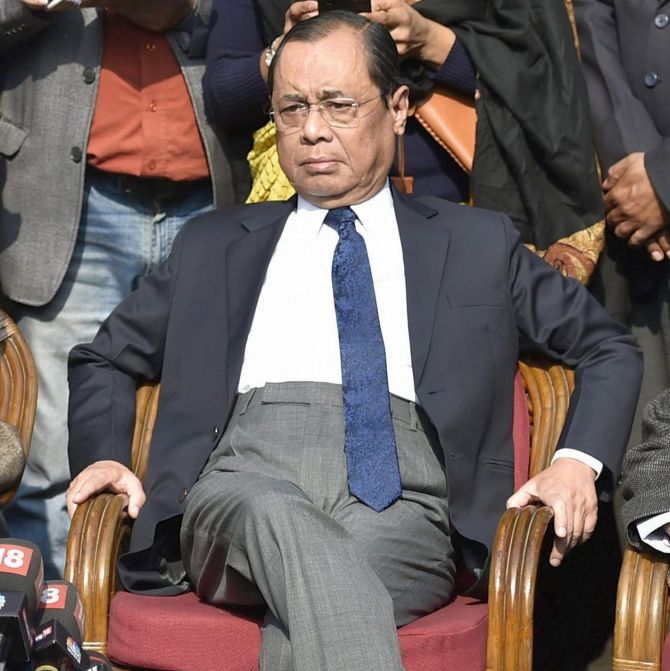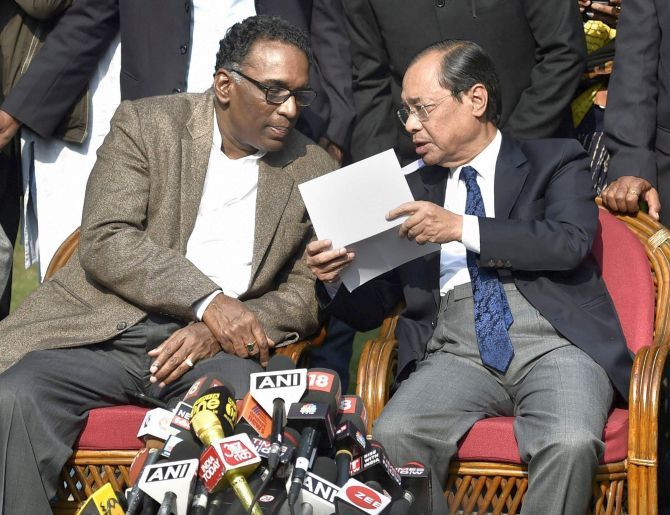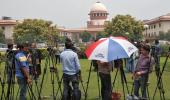'I am not an astrologer... I am not (worried). I hope that does not happen (Justice Ranjan Gogoi being denied the Chief Justice's position).'
'If it happens, it will only prove what we said in the (January 12 press conference) was true,' Supreme Court Justice J Chelameswar said on Saturday.
Who is the judge next in line to be Chief Justice of India?
M J Antony tells us about Justice Gogoi who has put 'discharging a debt to the nation' above the prospect of being the next CJI.

IMAGE: Supreme Court Justice Ranjan Gogoi at the January 12, 2018 press conference. Photograph: Ravi Choudhary/PTI Photo
Among the four senior-most Supreme Court judges who were seen rebelling against the Chief Justice of India at the press conference last Friday, the presence of Justice Ranjan Gogoi had a special significance.
In the normal course, Justice Gogoi would be elevated to the post of Chief Justice when the present incumbent, Justice Dipak Misra, retires in October.
The irony of this is that Justice Misra, against whom Justice Gogoi registered his protest, has to recommend him to the government for his elevation to the highest judicial post in the country.
That is the revered convention, though it had been broken twice by Indira Gandhi, leading to turmoil in her days.
Justice Gogoi was very brief at the press conference where the second senior-most judge in the hierarchy, Justice Jasti Chelameswar was vocal.
Justice Gogoi's pithy remark was that the four judges spoke against the Chief Justice only in the interests of democracy and they were 'discharging a debt to the nation.'
When asked whether the allotment of the case of Judge B H Loya, whose mysterious death is being probed, had anything to do with the protest, he just nodded, but nothing more.
The media is on a fishing expedition over what happens at the morning gathering of 25 Supreme Court judges at which they usually sip tea and exchange pleasantries before going to their respective courtrooms.
A tight lid has been put on what is happening inside the hall. The routine Wednesday lunch is also behind the cloak, as the staff have been asked to withdraw. Justice Gogoi has said there is no crisis and things will be sorted out.
Despite reassurances, what happens officially seems to confirm the allegation of the four judges.
Justice Gogoi has not found a place in any of the Constitution benches, now sitting in the Supreme Court, over which Chief Justice Misra presides.
One of the main allegations by the Famous Four against the Chief Justice was that sensitive cases are allotted to judges ignoring seniority, often cherry-picking juniors for no apparent reason.
For instance, the Constitution bench currently hearing the Aadhaar case has none of the senior judges who went public on the lawns of Justice Chelameswar's residence.
Normally, Constitution benches have senior judges, though juniors are also included, depending on their expertise and background.
The fact that Justice Gogoi is not on any of the Constitution bench cases listed for the current season appears anomalous, however.
The formidable list of cases before the current bench includes, apart from Aadhaar, hot-button issues like whether a law-maker facing a criminal trial would stand disqualified, entry of women into the Sabarimala temple in Kerala, a Parsi woman's religious status while marrying a man outside her community, whether a married woman would be guilty of adultery and LGBT rights.
The bench over which the Chief Justice presides will decide all these issues. The rebels have no room on the bench.
Thus, while the Chief Justice is presiding over the Constitution bench of five judges in the adjacent court room, Justice Gogoi was given a list of cases on January 18 that are referred to officially as 'simple money and mortgage matters', a few appeals by ordinary criminals and some petitions by wives who want their divorce cases to be transferred to a place convenient to them.

IMAGE: Supreme Court Justice Ranjan Gogoi, right, confers with Supreme Court Justice Jasti Chelameswar at the January 12 press conference in New Delhi. Photograph: Ravi Choudhary/PTI Photo
Known for his strict conduct of the court, Justice Gogoi, 64, is the son of a former Assam chief minister.
He started his practice in the Gauhati high court where he was elevated as a judge in 2001. He was later transferred to the Punjab and Haryana high court where he became the chief justice. He joined the Supreme Court in 2012.
Now the speculation is whether he has lost his chance to become the first Chief Justice from the north east by raising an unprecedented ruckus in the judiciary at a historical juncture.
Even if the differences are patched up, the next few months might have unpleasant undercurrents.
Justice Gogoi is not a prolific writer of judgments like the present Chief Justice. But his range is wide.
He recently laid down norms for giving the title 'senior advocate' to lawyers, a contentious issue in the legal profession.
Indira Jaising, the lawyer who moved the petition, won half the battle in bringing order to the current system in which political influence and corruption played a role. The judgment bordered on legislation.
The judge also ruled in the case Ram Nath vs Goberdhan that under the Hindu Women's Right to Property Act, upon the death of a Hindu man, his widow became entitled to a share in the joint family property.
In this case involving four women and five men, the women got just portions after the judge made intricate calculations over 10/144th share, after depicting a huge family tree.
He has also delivered significant judgments on trademarks, income tax and sick industries.
Justice Gogoi's competence is unquestioned.
When he becomes the Chief Justice, his main task would be to set down some rules by which benches are constituted. It is woolly convention which led to the present crisis.
Parliament has not been able to codify its privileges and goes largely by conventions. Can the judges get together and lay down guidelines to make sense of conventions?
This is the challenge facing the present and next Chief Justice.










